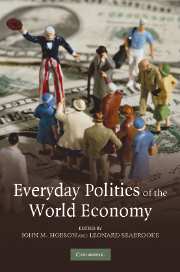Book contents
- Frontmatter
- Contents
- List of tables
- List of contributors
- Acknowledgements
- 1 Everyday IPE: revealing everyday forms of change in the world economy
- Part I Regimes as cultural weapons of the weak
- Part II Global economic change from below
- Part III Bringing Eastern agents in
- 8 Eastern agents of globalisation: Oriental globalisation in the rise of Western capitalism
- 9 Diasporic agents and trans-Asian flows in the making of Asian modernity: the case of Thailand
- 10 The agency of subordinate polities: Western hegemony in the East Asian mirror
- 11 Conclusion: everyday IPE puzzle sets, teaching and policy agendas
- Bibliography
- Index
9 - Diasporic agents and trans-Asian flows in the making of Asian modernity: the case of Thailand
Published online by Cambridge University Press: 22 September 2009
- Frontmatter
- Contents
- List of tables
- List of contributors
- Acknowledgements
- 1 Everyday IPE: revealing everyday forms of change in the world economy
- Part I Regimes as cultural weapons of the weak
- Part II Global economic change from below
- Part III Bringing Eastern agents in
- 8 Eastern agents of globalisation: Oriental globalisation in the rise of Western capitalism
- 9 Diasporic agents and trans-Asian flows in the making of Asian modernity: the case of Thailand
- 10 The agency of subordinate polities: Western hegemony in the East Asian mirror
- 11 Conclusion: everyday IPE puzzle sets, teaching and policy agendas
- Bibliography
- Index
Summary
This chapter explores Asian agency in the making of capitalist modernity in Thailand. The previous chapter, by showing how the West was shaped throughout its formative period (500–1800) by all manner of Eastern agents and influences, argues that East and West have never been discrete civilisations but are better understood as ‘creolised formations’. This chapter brings the critique of Eurocentrism up to the present day. It challenges the Eurocentric view that Asian modernity has been constructed by, or is derivative of, the West. Instead, I show that Asian modernity has been significantly produced by the agency of the Chinese diaspora and trans-Asian flows (for a full account see Wilson 2004).
This chapter analyses the making of modernity in Thailand through a social history of the consumer economy in Bangkok, which has materially and symbolically created a modern infrastructure in Bangkok. Drawing on historical, ethnographic and feminist approaches, I present an extended discussion of one major Sino-Thai family business in order to illustrate the grounded practices and processes – including kinship and gender relations – behind capitalist development in Thailand.
As the discussion of Bangkok's department stores makes clear, Thailand's capitalist modernity was produced by Asian actors and trans-Asian flows. The key entrepreneurs in Thailand's development came from the Chinese diaspora in Southeast Asia.
- Type
- Chapter
- Information
- Everyday Politics of the World Economy , pp. 160 - 176Publisher: Cambridge University PressPrint publication year: 2007



